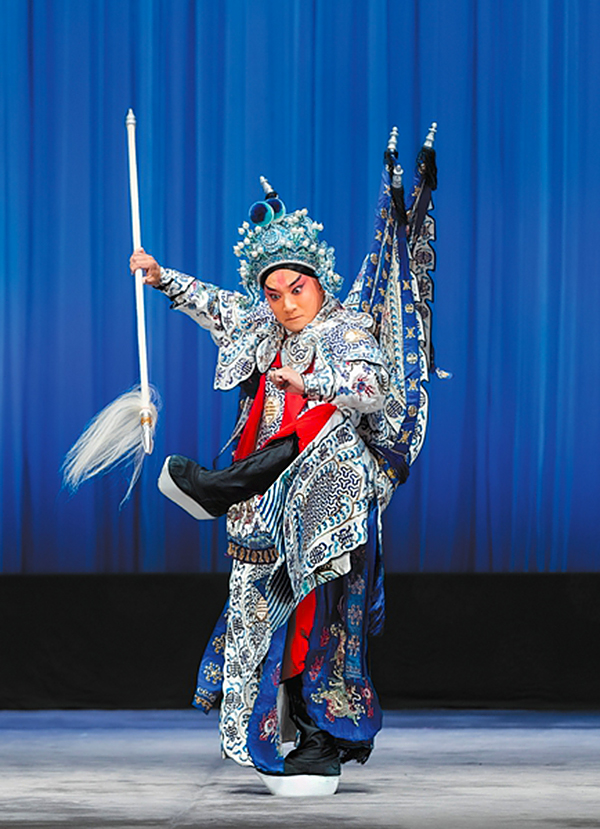Beijing Opera Performer: General Zhao Yun: 京剧艺人: 趙雲
Beijing Opera singer dressed as the young Shu general Zhao Yun. Zhao Yun's portrayal are usually distinguished by it's porcelain colored color scheme of elaborate blue tracery over white.
Historically Zhao Yun was one of the most famous warriors of the Three Kingdom's period. His fearless and solo exploits during the chaotic Shu retreat during the Battle of Changban included one of the most famous scenes of the Three Kingdoms romance and historiography. Sworn to his lord Liu Bei- the founder of Shu before both had made their names, the youth became one of Liu Bei's most reliable commanders.
Liu Bei had to flee for his life, galloping away south with Zhang Fei, Zhao Yun and Zhuge Liang, and forced to leave his family and the populace behind. Cao Cao's forces soon captured all of his army and his baggage and took the city. In the chaos, Zhao Yun disappeared, prompting suspicion that he had surrendered to Cao Cao. When someone reported that to Liu Bei, Liu angrily threw a halberd at the man and declared "Zilong (Zhao Yun's courtesy name) would never desert me." What followed was perhaps one of the most iconic scenes in all of Chinese history and one of the most recognized moments in East Asian literature.
In fact, when Zhao Yun heard that Liu's family was left behind, the youth had galloped alone back into the burning besieged city. After braving through many besiegers, he found Liu Bei's wife and Liu Bei's infant son- Liu Shang, and strapped the baby on his shoulders. Then, dodging Cao Cao's pursuers and racing out of the city, Zhao Yun came back with Liu Bei's infant son Liu Shan along with Liu Bei's wife Lady Gan. Liu Bei was greatly moved and Zhao Yun was promoted to General of the Standard (牙門將軍). He would spend the following near 50 years warring on Shu's behalf until his old age, long after the passing of his lord.
ZHAO YUN AS PORTRAYED IN MEDIA
His name of "Yun" 云 literally means "Cloud" or "Nimbus." Zhao Yun's depictions are quite particular, according to near contemporary records, the young Zhao Yun was handsome, athletic, and tall. Traditional depictions of Zhao Yun characterized him as an idealistic and virtuous paladin, fearless, loyal, and honorable in a world of realpolitik treachery and suffering. White is always associated with him, which represents his purity, and Zhao Yun is always depicted on a horse of perfect white which is called "Bailong" ~ which literally means "White Dragon." There is some historical basis to this claim because in Zhao Yun's youth he was part of the elite "White Horse Oath Volunteers"~ an entire unit of crack light cavalry skirmishers who only rode white horses.
Zhao Yun in old age. Zhao Yun would serve Shu in a long military career that spanned nearly 50 years. When he died he was greatly honored by the Emperor and made the Marquis Shunping "Marquis of Loyalty and Tranquility." The Emperor being none other than the babe he had personally saved well grown.
Zhao Yun as he is portrayed in KOEI's popular Romance of the Three Kingdoms series. Because the novel Romance of the Three Kingdoms was written during the dawn of the Ming dynasty (by then- especially at the tail end of the Yuan dynasty) there was a massive revival of stories honoring this period and it's lofty heroes. The historiography and folk legends- especially from southern China and the Red Turban Rebels often casted themselves as these fabled paragons of old.
Zhao Yun (center) surrounded by Cao Cao's generals in the Battle of Changban
Because of this reason, many statues, armors, paintings of the Three Kingdoms heroes and villains often have them depicted in the beautiful armors of the Song- Yuan - Ming styles. Because of this much later frame of reference this is why they are anachronistically depicted in medieval Chinese armor rather than that of the more historically accurate Han era armors. Similar parallels exists in Shakespearean or Baroque times, where Classical heroes such as Alexander and Caesar would be depicted in Renaissance armors in these contemporary retellings.
Illustration of Zhao Yun in anachronistic medieval armor by the talented Tsuyoshi Nagano which depicted the young warrior carrying Liu Bei's infant son during the siege of Chanban. Zhao Yun's steadfast devotion to his lord, and the type of fanatical suicidal loyalty Liu Bei inspires had been long used to (biasly) justify Liu Bei as a moral and ideal ruler in this cynical era. In a hopeless age of chaos and Machiavellian warlords it was a moment, full of humanity and universal emotions immortalized.
Zhao Yun portrayed in Three Kingdom Total War.
Zhao Yun in Beijing Opera. Followed by Zhao Yun's alternative DLC armor from KOEI's Dynasty Warriors game.
Music: 《战马超》(Zhao Yun's) Battle with Ma Chao
Zhao Yun in the upcoming action-role playing video game Wo Long Fallen Dynasties. The game is developed by Team Ninja and published by Koei Tecmo and sat during the chaotic wars of the Three Kingdoms era. In this new portrayal, Zhao Yun is depicted in a much more authentic Eastern Han dynasty armor.
Music: "The Arduous Road to Shu."
Thank you to my Patrons who has contributed $10 and above: You made this happen!
➢ ☯ MK Celahir
➢ ☯ Muramasa
➢ ☯ Thomas Vieira
➢ ☯ Kevin
➢ ☯ Vincent Ho (FerrumFlos1st)
➢ ☯ BurenErdene Altankhuyag
➢ ☯ Stephen D Rynerson
➢ ☯ Michael Lam
➢ ☯ Peter Hellman
➢ ☯ SunB
























Comments